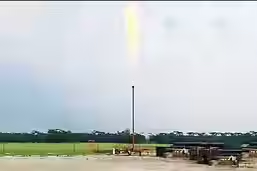Energy News
Sep 11, 2025
Energy diplomacy: In Bangladesh’s hour of need, how India is offering affordable power solutions
Power imports, mainly from an Adani Power-run coal-fired plant in eastern India, rose 70% in the seven months through July and helped satisfy most of the rising demand, government data showed.

Source: Deccan Herald
Sep 10, 2025
Lighting rural growth: The promise of renewable energy in Bangladesh
Despite remarkable progress in recent decades, Bangladesh remains highly vulnerable to the global climate crisis. Ranked 7th among the world's most disaster-prone nations, the country faces growing climate risks that are expected to intensify in the coming years, with the hardest impact among the rural lives and livelihoods.

Source: The Business Standard
Sep 5, 2025
Renewables crucial for Bangladesh energy security
Role of Renewable Energy (RE) is becoming very crucial for Bangladesh's electricity generation aimed at ensuring sustainable future of the energy security and environmental protection from carbon emissions.
“Bangladesh is making strides for green energy revolution to tackle climate change and energy security, despite its current reliance on fossil fuels,” said energy expert engineer Khandkar Saleque Sufi.

Source: BSS News
Sep 4, 2025
Bangladesh Becomes LNG’s Hottest Story
Bangladesh has become Asia’s most active buyer of spot LNG cargoes – an unlikely new heavyweight in one of the world’s most volatile energy markets. Once largely self-sufficient in natural gas, the country now leans heavily on imported fuel to keep its factories running and its power sector alive. The shift is dramatic: gas still meets 43% of Bangladesh’s total energy needs, but domestic production is falling, reserves are dwindling, and the gap is being filled at a soaring cost. What began as a stopgap after shortages in 2017–18 has snowballed into structural dependence, pushing Bangladesh into the spotlight of the global LNG trade – and exposing the financial and systemic weaknesses that brought it there.

Source: Oil Price
Aug 31, 2025
How merchant plants are redefining Bangladesh’s energy sector
Bangladesh is shifting from a government-dominated power sector to a market-driven model. It aims greater competition, reduced subsidies, and a boost for renewable energy
Bangladesh is stepping into a new chapter in its energy journey with the Merchant Power Plant Policy (MPPP). Under this policy, private power producers will be able to sell electricity directly to businesses and consumers through the national grid, opening the market to competition.

Source: The Business Standard
Aug 30, 2025
Banking on Sustainability: How Bangladesh is building a greener future
Sustainable finance is emerging as a defining theme for the banking industry in Bangladesh, a country that is acutely vulnerable to the impacts of climate change. Recognising this urgency, Bangladesh Bank introduced the sustainability rating system in 2020. According to the central bank's Sustainability Finance Report 2024, ten private commercial banks and two financial institutions have been rated as sustainable financial institutions. The evaluation is based on five key indicators: the Sustainable Finance Index, CSR activities, green project financing, the Core Banking Sustainability Index, and Banking Services Coverage.

Source: The Daily Star
Aug 30, 2025
Nine firms show interest in supplying LNG from Bhola gas
At least nine local and international companies have expressed interest in supplying 30 million cubic feet per day (mmcfd) of gas from Bhola – by converting it into LNG – for industries under Titas Gas Transmission and Distribution Company.

Source: Just Energy News
Aug 29, 2025
Bangladesh unveils long-term energy roadmap
Bangladesh has unveiled a comprehensive short-, mid-, and long-term roadmap for its energy sector, aimed at strengthening energy security, diversifying supply sources, and reducing dependence on imports.
The plan prioritises natural gas exploration, LNG imports, refinery expansion, and renewable energy integration to meet growing demand.

Source: Just Energy News
Aug 26, 2025
Setting realistic energy targets
Properly calibrated projections are therefore essential to shape policies that prioritize energy efficiency
As Bangladesh looks ahead as an economy, there is a need for addressing what has long been an issue for the nation - its increasing demand for energy. However, given the advent of climate change and our vulnerability to it, as projections are outlined for our energy needs, they must be grounded in practicality and data-driven insights, while also having an eye towards sustainability.

Source: Dhaka Tribune
Aug 25, 2025
Bangladesh needs 35GW renewables, $42b to meet 2040 target: CPD
Fossil expansion may derail clean energy goals, warns the think tank
Bangladesh will need to install more than 35 gigawatts (GW) of renewable energy capacity to reach its 30% clean energy target by 2040, , as set out in the newly drafted Renewable Energy Policy, according to a new report by the Centre for Policy Dialogue (CPD).

Source: Daily Sun
Aug 24, 2025
Rampal plant feeds national grid with 10.5 billion units
The power plant is a joint venture between Bangladesh and India, implemented by the Bangladesh Power Development Board (BPDB)
The Rampal thermal power plant has emerged as a key contributor to Bangladesh’s energy supply, delivering over 10.5 billion units of electricity to the national grid.

Source: Daily Sun
Aug 24, 2025
Gas reserves are running out
The country's gas reserves are running out. Production is declining continuously. If new gas fields are not discovered and extraction from new mines is not started, domestic reserves may run out in the next eight years.
Currently, 1.8 billion cubic feet of gas is extracted from domestic gas fields per day. In 2017, it was around 2.7 billion cubic feet. That is, domestic gas extraction has decreased by 33 per cent.

Source: Prothom Alo
Aug 23, 2025
How flawed policy keeps shutting gas-fired power plants amid fuel shortage
Policy backfires. These two words perfectly sum up Bangladesh's gas-based power strategy.
For two decades, the country has grappled with a widening gas shortage, even after importing LNG. Yet, the previous government kept approving gas-fired power plants without securing fuel.

Source: The Business Standard

